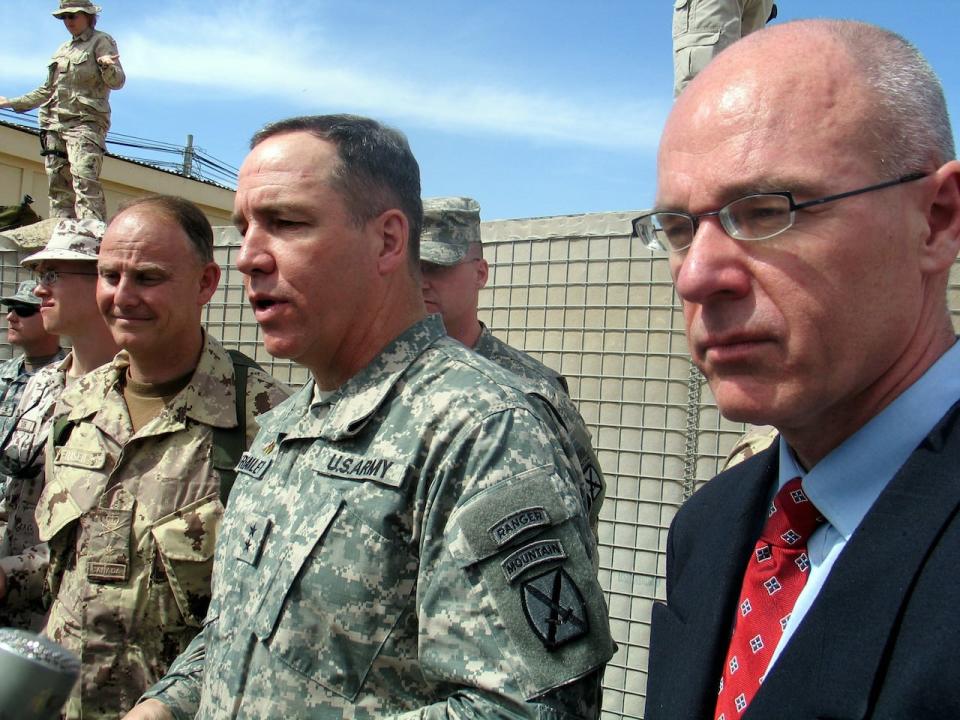Canada’s Special Representative to Afghanistan David Sproule is condemning the Taliban’s latest curtailment of women’s rights.
The regime moved earlier this week to bar women from reciting the Qur’an or hearing each other pray.

From left, Brig.-Gen. David Fraser, U.S. Maj.-Gen. Benjamin Freakley and David Sproule, then the Canadian ambassador to Afghanistan, speak with reporters after a change of command ceremony on Feb. 28, 2006 in southern Afghanistan. (The Canadian Press)
“They seem to come one after another, these edicts which further repress women and exclude them from the public space. And it’s so discouraging, and I think that any illusions about the Taliban and their motives and their policies have long been extinguished,” Sproule told CBC News in an interview on Friday.
Sproule is a former Canadian ambassador to Afghanistan; he served there between 2005 and 2007.
In August 2021, after Kabul fell to the Taliban, then-Foreign Affairs minister Marc Garneau tapped him to represent the Canadian government in dealings with the new regime.
“Every time I think that maybe we’ve reached the full limit of the suppression, there’s another edict and there’s more,” Sproule said.
UN, activist call for stronger action from Canada
His words come after a recent visit to Canada by United Nations Special Rapporteur on Human Rights in Afghanistan Richard Bennett. He urged Ottawa to step up its support for international human rights and grant refugee status to all Afghan women and girls seeking asylum here.
“I encourage Canada to sustain its commitment to lifesaving and basic human needs initiatives, such as education, livelihoods, and human rights activities, including legal aid and safe migration programs,” Bennett wrote in a statement released earlier this week.
Friba Rezayee, an Afghan activist now based in Canada, said Canada should go even further and called for military action.
“Whenever they’re condemning the Taliban for their wrongdoings, it doesn’t register with the Taliban,” she told CBC News. “Taliban don’t read and Taliban don’t care, because for them it’s just empty words.”
Rezayee runs Women Leaders of Tomorrow, a Vancouver-based organization that advocates for the education and empowerment of Afghan women.
Rezayee suggested both that the Canadian Armed Forces return to Afghanistan and that the government provide armed support to one of the main resistance groups confronting the Taliban — the National Resistance Front of Afghanistan, a military alliance based in the country’s north.


Friba Rezayee, who was one of Afghanistan’s first two female Olympians in 2004, poses for a photograph in Vancouver on Wednesday, September 1, 2021. (Darryl Dyck/Canadian Press)
She also said Canada could recognize the Taliban’s assault on women’s rights as gender apartheid, which could lead the International Criminal Court to launch legal proceedings against the regime.
A UN Human Rights Council report released last year concluded that the Taliban could be committing gender apartheid.
Sproule said he does not expect the Taliban’s grip on power in Afghanistan to slip in the foreseeable future.
“I think Afghanistan will probably have to face a continuation of Taliban rule,” he said.
He also said there is significant international agreement on the need for a “long-term political situation which would mean sharing of power and easing of severe restrictions that have been put on Afghans, most especially women and girls.”
“The combination of internal pressure and external pressure is really starting to build,” he added.
Sproule said Canada supports the political message of the National Resistance Front but cannot encourage armed action against the regime.

